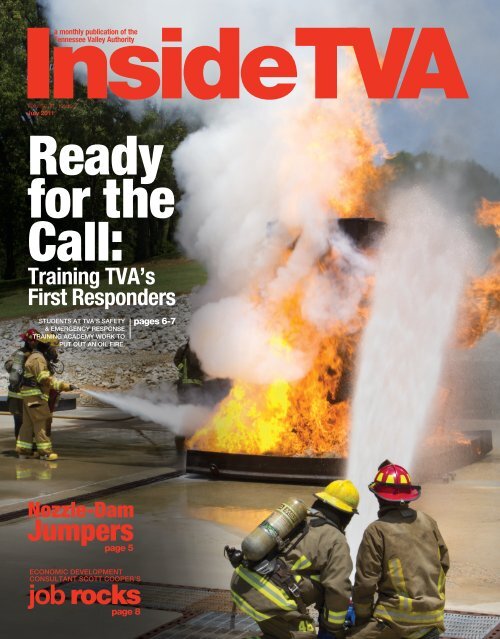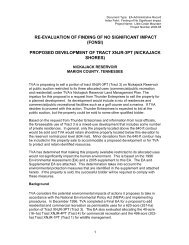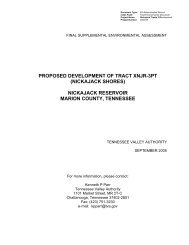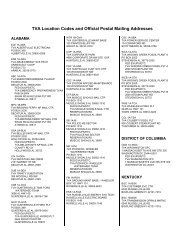Jumpers - Tennessee Valley Authority
Jumpers - Tennessee Valley Authority
Jumpers - Tennessee Valley Authority
You also want an ePaper? Increase the reach of your titles
YUMPU automatically turns print PDFs into web optimized ePapers that Google loves.
InsideTVA<br />
a monthly publication of the<br />
<strong>Tennessee</strong> <strong>Valley</strong> <strong>Authority</strong><br />
Volume 31, Issue 7<br />
July 2011<br />
Ready<br />
for the<br />
Call:<br />
Training TVA’s<br />
First Responders<br />
stuDEnts at tva’s safEty<br />
& EmErgEncy rEsponsE<br />
training acaDEmy work to<br />
put out an oil firE.<br />
Nozzle-Dam<br />
<strong>Jumpers</strong><br />
page 5<br />
Economic DEvElopmEnt<br />
consultant scott coopEr’s<br />
job rocks<br />
page 8<br />
pages 6-7
In this issue<br />
July 2011<br />
On Wings of leather 3<br />
across tVa 4<br />
Nozzle-Dam <strong>Jumpers</strong> 5<br />
ready for the call: training<br />
tVa’s First responders 6-7<br />
My Job rocks – economic Development<br />
consultant scott cooper 8<br />
tVa retirees annual Picnic 9<br />
New retirees 9<br />
racquet Man George Provost 10<br />
applause! 11<br />
Welcome New employee: archaeologist<br />
Michaelyn harle 11<br />
20 Years of energizing the Future 12<br />
Nuclear PlaNts<br />
Bellefonte – Susan Gentle<br />
Browns Ferry – Amy Reagan,<br />
Jim Nesbitt<br />
Sequoyah – Shannon Ridinger<br />
Watts Bar – Jim Hopson<br />
FOssIl PlaNts<br />
Allen – Josephine Moore<br />
and Angela Simpson<br />
Bull Run – Mary Nolan<br />
Colbert – Sharon Johnson<br />
Cumberland – Sandra Parchman<br />
Gallatin – Kriste Lanius<br />
John Sevier – Norma Cato<br />
Johnsonville – Stefanie Moore<br />
Kingston – Beth Jackson<br />
staff & CONtRIBUtORs<br />
Carolyn Minter<br />
Senior Manager, Employee<br />
Communications<br />
La’Nita Jones<br />
Editor<br />
Brooks Clark<br />
Production Editor<br />
Cletus Mitchell<br />
Photo Editor<br />
Damien K. Power<br />
Chief Photographer/<br />
Contributor<br />
CORRespONdeNts<br />
suggestions for articles can be sent to the following correspondents:<br />
Paradise – Janet Tingley<br />
Shawnee – Debby Abell<br />
Widows Creek – Debbie Crabtree<br />
POWer sYsteM OPeratIONs<br />
and saFetY PrOGraMs<br />
Myra Ireland<br />
eNVIrONMeNt & techNOlOGY<br />
Bill Sitton<br />
Nuclear GeNeratION<br />
DeVelOPMeNt & cONstructION<br />
Terry Johnson<br />
FOssIl POWer GrOuP<br />
Jessica Stone<br />
addItIONal INfORmatION<br />
Shannon Ridinger<br />
Contributor/<br />
Correspondent<br />
Bill Sitton<br />
Contributor/<br />
Correspondent<br />
Jessica Stone<br />
Contributor/<br />
Correspondent<br />
Julie Taylor<br />
Contributor/Staff<br />
TVA is an equal-opportunity and affirmative-action employer. TVA also ensures that the<br />
benefits of programs receiving TVA financial assistance are available to all eligible persons,<br />
regardless of race, color, sex, national origin, religion, disability or age.<br />
Inside TVA will be made available in alternate format, such as Braille, large print or<br />
audiocassette, upon request. For information, call 865-632-4676 (TTY 865-632-2178).<br />
Inside TVA is printed on recyclable, 100-percent post-consumer recycled paper.<br />
Comments and suggestions are welcome. Send them to Inside TVA, SP 2B-C, 1101 Market<br />
St., Chattanooga, TN 37402, or call 423-751-2540. Retirees with mailing-address changes<br />
should call Retirement Services at 865-632-2672.<br />
Inside TVA is available on the TVA website at www.tva.com/insidetva<br />
Hot topics<br />
Multi-Skill Program Provides New Training<br />
Opportunities<br />
an agreement signed in march by tva and<br />
the trades & labor council for tva annual<br />
employees formalized a new multi-skill<br />
program.<br />
peyton Hairston, tva senior vice president<br />
of Diversity & labor relations, says the<br />
initiative provides new training opportunities<br />
for electrical and mechanical maintenance<br />
workers in the fossil power and nuclear<br />
power organizations.<br />
“the program enables employees to become<br />
experts on the equipment maintained in their<br />
specialty area, reducing instances of faulty<br />
repairs that require rework,” says robert fisher,<br />
tva senior vice president, fossil power group.<br />
as part of the program, a second level ii position<br />
– technician journeyman – has been created to<br />
help retain journeyman skills. in addition, training<br />
for a new level iv specialty technician will begin<br />
by the end of fiscal year 2011.<br />
“the multi-skill program’s vision is aligned with tva’s renewed vision,” says chief<br />
nuclear officer preston swafford. “the program improves tva’s core business by<br />
offering tva the ability to respond to the dynamic needs of the energy industry. it<br />
provides in-house experts who we can rely on to build wider safety margins, wider<br />
operating margins and greater reliability.”<br />
meetings are planned to roll out the program to electrical and mechanical maintenance<br />
employees at every fossil and nuclear plant.<br />
— Julie taylor<br />
Richard Howorth Sworn In as a TVA Board Member<br />
Richard Howorth (right) is sworn in by his<br />
brother, Andrew K. Howorth, a circuit court<br />
judge.<br />
on tHe cover<br />
Cletus mItChell<br />
Fossil Power Group Senior Vice President<br />
Robert Fisher addresses TVA’s plant and<br />
maintenance managers and union business<br />
managers at a meeting hosted by TVA and<br />
the Trades & Labor Council for TVA annual<br />
employees.<br />
the u.s. senate voted on June 30 to<br />
approve the nomination of richard Howorth<br />
for the tva board of directors, and he<br />
was sworn in on July 13. His term will run<br />
through may 18, 2015. the tva board is<br />
now at full strength with nine members.<br />
Howorth, a graduate of the university of<br />
mississippi, is the owner of square Books,<br />
a leading independent bookstore in oxford,<br />
which he founded in 1979. He is a former<br />
president and chairman of the board of<br />
the american Booksellers association, the<br />
nation’s trade association of bookstores,<br />
established in 1900.<br />
Howorth served two terms as the mayor of oxford, from 2001 to 2009, when he chaired<br />
the authority overseeing the oxford Electric Department. He also served eight years<br />
as a director and officer of the north mississippi industrial Development association, a<br />
consortium of power association directors and city mayors in 29 mississippi counties in<br />
the tva service area.<br />
COVER PHOTO – fire training students, guided by instructors, work in teams to put out<br />
an oil fire at tva’s safety & Emergency response training academy. the academy trains<br />
hundreds of tva employees each year on how to fight the unique and challenging fires that<br />
can occur at their facilities. photo by Damien k. power.<br />
DamIen K. Power
On Wings of Leather<br />
Counting noses in the bat Caves<br />
Every year a group of intrepid TVA<br />
biologists set out to take a census of<br />
the population of bats living in the TVA<br />
service area. Working side by side with<br />
their compatriots from the <strong>Tennessee</strong><br />
Wildlife Resources Agency, they fight to<br />
protect threatened species such as the<br />
grey bat (myoits grisescens), which take<br />
shelter in the caves along the <strong>Tennessee</strong><br />
River.<br />
“It’s our responsibility as an agency<br />
to protect this species,” says TVA<br />
Endangered Species Biologist Hill Henry.<br />
“We have counted the bats annually for<br />
the past 15 years because they are a<br />
federally endangered species.”<br />
One such cave sits literally on the<br />
<strong>Tennessee</strong> River, or more specifically,<br />
Nickajack Reservoir. The rectangular<br />
entry opens to what was once a Civil War<br />
saltpeter mine, prior to the construction<br />
of Nickajack Dam. Now flooded with<br />
several feet of water, the cave is further<br />
protected by an iron gate meticulously<br />
hung to keep anglers and recreational<br />
boaters and cavers from entering.<br />
By DAmIEN K. POWER<br />
The reservoir’s shoreline offers dozens<br />
of species of insects an ideal home and<br />
breeding ground, which in turn creates a<br />
veritable buffet for our flying mammalian<br />
friends. Dining on a smorgasbord of<br />
mayflies, moths, neuoptra, caddis<br />
flies and stone flies, thousands of bats<br />
swarm the dusk; zipping along at an<br />
average of 13 miles per hour.<br />
“Inside the cave, closer to where they<br />
roost, we set up thermal cameras<br />
to more accurately capture them<br />
during their emergence,” explains TVA<br />
Terrestrial Biologist Charles Hofer.<br />
Keeping tabs on these small bats has<br />
been an important project, which has<br />
in recent years shown the species<br />
clawing its way back from endangered<br />
into merely threatened territory.<br />
Unfortunately, a new threat looms on the<br />
horizon: white nose syndrome.<br />
A deadly fungus, white nose syndrome,<br />
makes its home on the faces and wings<br />
of several species of bats. Bat colonies<br />
afflicted with white nose syndrome have<br />
Below, TVA biologists and TWRA wildlife managers work near the Nickajack grey bat colony on Nickajack<br />
Reservoir. At right, TVA Terrestrial Biologist Charles Hofer equipped with his headlamp. Right bottom, TVA<br />
Endangered Species Biologist Hill Henry explains the need to monitor the bat population.<br />
seen close to 90 percent mortality rates.<br />
While many bats are migratory, the most<br />
likely cause of this savage plague are<br />
recreational hikers tracking dirt from<br />
infected caves to caves that have not yet<br />
been affected.<br />
“Currently, grey bats have not been<br />
found to have white nose syndrome,”<br />
says Chris Simpson, a wildlife manager<br />
for the <strong>Tennessee</strong> Wildlife Resources<br />
Agency. “However, we are surveying<br />
caves across the state.”<br />
Go to the online Inside TVA to watch a<br />
video of the bat caves. n<br />
Inside TVA | July 2011 | 3<br />
DamIen K. Power
4 | July 2011 | Inside TVA<br />
ACROSS TVA<br />
WKU President Gary Ransdell (left) receives the check from Tim Hughes, Distributor Delivery manager<br />
for TVA Customer Service in the Kentucky District, and Mark Iverson, Bowling Green Municipal Utilities<br />
general manager.<br />
wku rewarded for Energy savings<br />
On June 27, TVA and Bowling Green municipal Utilities presented a check for $106,390<br />
to Western Kentucky University to reward the university’s investments in energy<br />
efficiency. Since joining TVA’s EnergyRight Solutions for Business program in march<br />
2010, WKU has trimmed electricity usage more than 500 kilowatts. The program, offered<br />
through Bowling Green municipal Utilities, pays up to $200 for every kilowatt saved.<br />
Western Kentucky retrofitted or replaced more than 70,000 lights in 35 campus<br />
buildings, which will result in a savings of more than 4.7 million kilowatt-hours per year.<br />
The school also replaced three HVAC chiller units, which provide cool water for air<br />
conditioning. The new high-efficiency units replaced equipment more than 30 years old.<br />
The initiatives were part of a larger campaign at WKU that included water conservation,<br />
improved insulation, harvesting rain water for irrigation and a solar collector to preheat<br />
the swimming pool at the Raymond B. Preston Health & Activities Center. In all, the<br />
school invested more than $9.6 million in energy saving measures, with a guaranteed<br />
energy savings of more than $1 million each year.<br />
tomorrow’s problem-solvers<br />
In a program sponsored by TVA to introduce girls to different technical careers, sixth<br />
grade girls from muhlenberg (Ky.) South middle School got the chance to actively<br />
problem-solve and create their own miniature “power plant” that generated electricity,<br />
as shown in the picture above. “The objective is to get these girls to think,” says Paula<br />
Pendergraff of Workforce Solutions, which helped organize the event. “We know we<br />
can’t teach them math or science in a day, but we can get them excited about knowing<br />
they can learn math and looking at other careers they typically would not consider.”<br />
Paula PenDergraff<br />
get ready to scream<br />
for ice cream!<br />
On June 24, Chief Information Officer Dan Traynor<br />
(above) and Director of Business Excellence Phil<br />
Zeringue served delicious Clumpies Ice Cream as<br />
a special thank you for Information Technology<br />
personnel’s hard work during the first 50 days<br />
of IT1K – a 1,000-day transformation initiative to<br />
improve the way IT does business.<br />
national trails Day<br />
improvements<br />
As part of TVA’s National Trails Day campaign on<br />
June 4, TVA staff and volunteers improved six TVAmanaged<br />
trails across the TVA service area. In the<br />
picture above, TVA Forester Darrell Cuthbertson,<br />
middle, and volunteers Avie Owenby, left, and Gene<br />
Brownell set the base for an information kiosk at<br />
East Lakeshore Trail along Tellico Reservoir.<br />
DamIen K. Power
Nozzle-Dam <strong>Jumpers</strong><br />
Climbing into an 800-ton steam<br />
generator may not sound like<br />
most people’s idea of a good time,<br />
but for an elite group of Nuclear Power<br />
employees, it’s just part of a normal day<br />
during a refueling outage.<br />
Employees who ordinarily work in various<br />
jobs across the nuclear sites volunteer<br />
to enter the steam generators to install<br />
and remove nozzle dams, the temporary<br />
closures that block the flow of water<br />
from the inlet-outlet nozzles. Known<br />
as “jumpers” because of the way they<br />
“jump” into the steam-generator bowls,<br />
the volunteers endure the discomfort of<br />
plastic jumpsuits worn over protective<br />
clothing topped with air-supplied bubble<br />
hoods. After intensive training and a<br />
thorough pre-job safety briefing, they<br />
work in highly radioactive, contaminated<br />
areas, often in hot temperatures, to<br />
complete their mission.<br />
Well-trained employees go inside steam generators to perform<br />
a critical job during refueling outages.<br />
The Mission<br />
There are two to four steam generators<br />
in a pressurized-water reactor. Steam<br />
generators are heat exchangers used<br />
to convert water into steam produced<br />
in a nuclear reactor core, like those at<br />
Sequoyah and Watts Bar nuclear plants.<br />
Nozzle dams consist of a metal center<br />
section attached to a rubber bladder that<br />
is joined together with two other metal<br />
end sections, which form a literal dam to<br />
hold back reactor coolant-system water.<br />
By SHANNON RIDINGER<br />
During a refueling outage, the jumpers<br />
install the nozzle dams in each generator<br />
allowing work to be performed on the<br />
steam generators. The nozzle dams keep<br />
water from the reactor coolant system<br />
out of the steam generator so it can<br />
be inspected during refueling outages.<br />
Toward outage end, the team removes the<br />
dams restoring the steam generators to<br />
their normal condition for plant operation.<br />
During the recent Unit 2 Refueling 17<br />
outage at Sequoyah, 19 jumpers installed<br />
and removed eight nozzle dams (two per<br />
generator). Led by Engineering Support<br />
manager Hussein Elbeitam, the team<br />
trained in a mock-up steam generator at<br />
Sequoyah months in advance of the outage.<br />
The training included a simulation of the<br />
actual environment inside the containment<br />
vessel, which houses the steam generators<br />
and reactor. Because of high radiation levels<br />
in the steam-generator bowls, the team<br />
learned to install and remove the dams<br />
quickly and efficiently to help ensure the<br />
lowest radiation dose possible.<br />
“We have a great team,” says Elbeitam.<br />
“most of these guys come back year after<br />
year because they enjoy the work. We had<br />
no safety events, no human performance<br />
errors and no personal contamination<br />
events during this outage.”<br />
“This was an opportunity to do something<br />
different than my regular job,” says<br />
Bryan Klein trains as a steam generator jumper.<br />
Trevor Owens, a first-time jumper and<br />
mechanical design engineer at Sequoyah.<br />
“I really wanted to help Hussein, and it<br />
also gave me an opportunity to actually<br />
put my hands on plant equipment, getting<br />
my hands dirty and contributing to a<br />
significant outage task.”<br />
Brett mcCreary, a long-time jumper and<br />
assistant to Hussein, says, “It is great<br />
having the new guys come on. What’s<br />
significant, though, is that employees save<br />
TVA money every outage by volunteering.<br />
These savings can be passed on to<br />
other areas of outage maintenance or<br />
modifications at Sequoyah.” n<br />
Members of the Sequoyah steam generator jump team are, left to right, in the back row Jeremy Hickey, Bryan Klein, Trevor Owens, Wigberto Flores-Hernandez, John Crawford,<br />
Blake Nida, Timothy Utley, Brett McCreary, Ron Ellison, Hussein M. Elbeitam, Terence Higgins and Ronald Beasley, and in the front row Jason Barrick, Monty Veal, John<br />
Lindley, Roosevelt Williams and Mickey Hogsed.<br />
Inside TVA | July 2011 | 5<br />
Photos by husseIn elbeItam
Ready for the Call:<br />
Training TVA’s First Responders<br />
6 | July 2011 | Inside TVA<br />
By JESSICA STONE<br />
TVA trainees prepare to put out an oil fire at the Safety &<br />
Emergency Response Training Academy. This fire simulates<br />
the amount of oil in a 55-gallon drum.
Photos by DamIen K. Power<br />
Aug. 16, 2010, started out like any other<br />
typical day for John Downs and his<br />
Operations co-workers as they prepared to<br />
increase the load on Unit 1 at Cumberland<br />
Fossil Plant. Then, just after 6 p.m.,<br />
they heard a loud boom as the Unit 1 B<br />
transformer exploded into flames.<br />
“We heard the boom and then started getting all the alarms,”<br />
says Downs, a unit operator who was an assistant unit operator<br />
at the time of the accident. He and the rest of the fire brigade<br />
were on the scene within minutes to fight the fire.<br />
“Everyone knew their role and worked together to get the fire<br />
out, keep the equipment cool and keep other equipment around<br />
the transformer from catching fire,” Downs says. “And we<br />
worked safely — pairing up, making sure no one got overheated<br />
or injured. We looked out for each other and the local firedepartment<br />
responders, too.”<br />
The reason they knew what to do is because Downs and his<br />
team were trained at a one-of-a-kind facility owned by TVA in<br />
marion County, Tenn.<br />
TVA’s Safety & Emergency Response Training Academy – or<br />
SERTA – has been in operation since the early 1980s and has<br />
provided classroom and hands-on training to countless TVA<br />
employees since opening. While the school provides training in<br />
medical, hazardous materials and rescue emergencies, the bulk<br />
of trainees — 500-plus a year — attend to get certified for site<br />
fire brigades. Each site in Nuclear Power, Fossil Power and River<br />
Operations is required to have a minimum number of people<br />
trained in firefighting.<br />
Starting SERTA<br />
Following a cable tray fire at Browns Ferry Nuclear Plant in 1975,<br />
TVA began to take a hard look at the fire training employees<br />
received.<br />
“It was clear we needed some specialized training to fight<br />
fires,” says Dykie Gentry, program manager for Fire & Technical<br />
Rescue Training. He says lessons learned from that fire drove<br />
TVA to look at what employees needed to successfully fight fires<br />
in an industrial setting.<br />
Before SERTA was established, students were sent to a staterun<br />
training center in murfreesboro, Tenn. While that school was<br />
effective to some extent, it focused on fires seen by municipal<br />
fire departments — like house fires. TVA facilities have unique<br />
components and situations that require additional knowledge.<br />
“We focus on issues employees come across in the plants, like<br />
cable tray, electrical board and transformer fires,” says Phil<br />
Johnson, SERTA supervisor. “you handle these differently than a<br />
house fire.”<br />
With average class sizes of 12-14 people, the classes teach the<br />
basics of how to fight fires of varying types and give students a<br />
chance to fight real fires. These fires, while controlled, are close<br />
simulations to the types of fires students are likely to see on the job.<br />
Tailored to TVA<br />
“most utilities have a facility to provide fire training,” Johnson<br />
says. “But the unique thing about SERTA is that we are the only<br />
training center in the nation that has live fire simulations where<br />
students are taught how to put out fires on energized electrical<br />
lines.”<br />
Once deemed too dangerous, putting out fires on “live”<br />
electrical lines is an exact science that can save time, lives and<br />
equipment.<br />
“Safety and Human Performance tools are absolutely key to the<br />
training,” says Greg Lewis, manager of Emergency Response<br />
Training. “Our mission is to teach TVA employees to safely<br />
respond to an emergency situation at one of our sites to protect<br />
people, plant equipment and the environment.”<br />
That mission comes to life when real-life events happen at TVA<br />
sites. “What we learned was very similar to the real event last<br />
August,” Downs adds. “People may think they won’t remember<br />
what they learned in class or that it will never happen at their<br />
plant, but it does happen, and we were well-prepared because<br />
of the training we got through SERTA.” n<br />
Academy staff and instructors are, left to right, Justin Thomas, Will Commins, Erin Moss, Phillip Johnson, Greg Lewis, Frank Rozzell, Jonathan Jackson, Dykie Gentry,<br />
Rob Traub, Steve James and Greg Van Horn.<br />
Inside TVA | July 2011 | 7
my job<br />
rocks<br />
By JULIE TAyLOR<br />
TVA employees are on the job 24/7, keeping the lights<br />
on, running the river system, managing TVA lands and<br />
supporting TVA’s operations. In this column, you’ll hear<br />
from TVA employees who can say, “My job rocks!”<br />
ScOTT cOOPeR | ECONOmIC DEVELOPmENT CONSULTANT<br />
8 | July 2011 | Inside TVA<br />
DamIen K. Power<br />
this year has been a whirlwind for<br />
scott Cooper. he was hired by tVa in<br />
January, his wife had a baby in may and<br />
he was chosen as one of Chattanooga’s<br />
20 leaders under 40 in June.<br />
Degree: Bachelor’s degree in mass communication, University of<br />
<strong>Tennessee</strong> at Chattanooga<br />
Hometown: Chattanooga<br />
Family: Wife, molly, and daughters Clarke Rose and Austin<br />
Why tvA?<br />
I had the opportunity to interact with TVA’s Economic Development<br />
folks since 2004 in my former job and always admired the<br />
professionalism and knowledge they brought to the table.<br />
Why does your job rock?<br />
my group interacts with community leaders, existing businesses<br />
and prospective businesses across the <strong>Tennessee</strong> <strong>Valley</strong>. It’s<br />
very satisfying when a community points to one of our programs<br />
as a catalyst for attracting a new company, expanding an existing<br />
business or spurring a new community initiative. With 20 counties<br />
and three states in my territory, no day is ever the same. That<br />
keeps it fun and interesting.<br />
What’s challenging about your job?<br />
I’m constantly challenged by all the acronyms. It’s like alphabet<br />
soup every day.<br />
How are you helping tvA realize its vision?<br />
my group is spreading the vision message on our travels throughout<br />
the <strong>Tennessee</strong> <strong>Valley</strong>. It’s the backbone of everything we do.<br />
Who would you like to shadow at tvA?<br />
I think it would be interesting to shadow a transmission line crew.<br />
I’m sure these folks have an unmatched perspective on things.<br />
First job?<br />
my first real job was working at a golf course, mowing greens,<br />
racking traps and dodging golf balls.<br />
if you had an afternoon off, what would you do?<br />
The left-field bleachers at Wrigley Field sound pretty good to me.<br />
Favorite movie?<br />
It’s a tie between Shawshank Redemption and The Sting.<br />
Favorite tv show?<br />
Seinfeld, hands down.<br />
How did you get selected for chatter Magazine’s “20 under 40”?<br />
I just got a call one day. my brother was selected as well. It’s a<br />
pretty cool honor for my family.<br />
Calling all roCkers<br />
If your job rocks, we want to know! Send an email to<br />
Insidetva@tva.gov.
MAke plAns now To join fellow reTirees for The fun, food And fellowship AT The<br />
TVA Retirees Annual Picnic<br />
sponsored by TVA<br />
TVA Retirees Annual Picnic sponsored by TVA<br />
friday, sept. 16, 2011 | guntersville, ala. at civitan park<br />
it’s frEE to rEtirEEs anD onE guEst. EacH aDDitional guEst is $8.<br />
36 Years<br />
Douglas e. Washburn, COO, Chattanooga<br />
33 Years<br />
James l. Brooks, COO, Rogersville, Tenn.<br />
Juan e. Gonzalez, Strategy & External Relations,<br />
Chattanooga<br />
WHeN: friday, sept. 16, 2011<br />
WHeRe: civitan park, guntersville, ala. picnic begins at 10 a.m. cDt<br />
The picnic is free for retirees and their spouse or guest | Additional guests are only $8 each<br />
name of retiree<br />
_______________________________________________<br />
spouse or guest name<br />
_______________________________________________<br />
retiree phone number<br />
_______________________________________________<br />
retiree home address<br />
_______________________________________________<br />
city ___________________________________________<br />
state ________________ Zip _____________________<br />
additional guests (please enclose $8 for each additional guest 12 years old and older).<br />
_________________________________________________________________________________________________<br />
_________________________________________________________________________________________________<br />
Make checks payable to Bvi. send to:<br />
tvA retirees Association, 400 W. summit Hill Drive, spt 5A, Knoxville, tn 37902.<br />
new retirees<br />
32 Years<br />
stanton M. Guinn, COO, Benton<br />
31 Years<br />
Jesse D. savage Jr., COO, Decatur, Ala.<br />
To register, call the TVA Retirees<br />
Association office toll-free at<br />
877-335-1222, or 865-632-4323, or use<br />
the form provided below and mail it to<br />
TVA Retirees Association, 400 W. Summit<br />
Hill Drive, SPT 5A, Knoxville, TN 37902.<br />
please RegIsteR<br />
By sept. 6, 2011<br />
Directions — to get directions from your<br />
house, go to a website such as MapQuest<br />
and enter the following address for your<br />
destination: 1150 sunset Drive, Guntersville,<br />
Ala. 35976<br />
Bus trAnsportAtion<br />
cHAttAnooGA — A bus from chattanooga<br />
will be available for $15 per person (nonrefundable).<br />
to make pre-paid reservations,<br />
contact c.D. Heidel at 423-476-6497 by<br />
sept. 6.<br />
Knoxville — A bus will not be available<br />
from Knoxville.<br />
Muscle sHoAls — A bus from Muscle<br />
shoals will be available for $15 per person<br />
(refundable up to sept. 6). to make prepaid<br />
reservations, contact cameron Kay at<br />
256-810-6569.<br />
30 Years<br />
Donna J. Green, People & Performance,<br />
Chattanooga<br />
For a list of other recent retirees,<br />
see the online Inside TVA.<br />
Inside TVA | July 2011 | 9
George Provost Connects His Love of the Game With Love of People<br />
10 | July 2011 | Inside TVA<br />
Racquet Man<br />
By BROOKS CLARK<br />
George Provost didn’t set out to<br />
become a tennis teacher. It just<br />
happened that way.<br />
Provost, 66, retired in 1999 as a procurement specialist in<br />
Chattanooga after 27 years at TVA. He had taken up tennis<br />
when he first started with TVA.<br />
Growing up in New Iberia, La., Provost had played baseball<br />
and basketball and run track, and he had always liked<br />
tennis. He got involved with the Racqueteers tennis club<br />
at Chattanooga’s Warner Park, captained a U.S. Tennis<br />
Association team that won a state championship and gave<br />
some lessons to eager students.<br />
One of his pupils was TVA management Assistant mae<br />
Eggleston. “George was a very patient teacher and great at<br />
analyzing the game,” says Eggleston. “All I had to do was<br />
call and tell him about my match; he would then ask me<br />
questions and analyze why I won or lost, and then tell me<br />
what I needed to do to improve.”<br />
Before long, Provost became president of the Racqueteers.<br />
“We had someone who was teaching kids,” he says. “One<br />
day he said he couldn’t do it anymore. Somebody had to do<br />
it, so it ended up being me.” Provost coached groups of 40 to<br />
50 children twice a week for five years.<br />
In 2000, Provost started a larger club, the Chattanooga River<br />
City Tennis Association, which plays on the 11 courts at the<br />
Brainerd Recreation Center. He’s coached there, on monday<br />
and Thursday evenings, ever since, usually about 40 kids and<br />
some adults.<br />
“It’s gratifying to provide instruction to inner-city kids and<br />
to watch them continue with tennis,” he says. Two former<br />
pupils went on to play for Baylor School located at the foot of<br />
Signal mountain in Chattanooga. One, Ashley macon, played<br />
for two years at the University of the South. The other, Jarius<br />
Anderson-Baylor, played intramural tennis at Washington<br />
University in St. Louis, mo. Both are now in medical school.<br />
“It wasn’t something I had planned,” says Provost. “It’s just<br />
the way the cards fell. Once you take these jobs, you can’t<br />
give them up.” n<br />
DamIen K. Power
Applause!<br />
Judy Bair, Certified Professional secretary/Certified<br />
administrative Professional, a business support<br />
representative in environment & technology, has been<br />
elected the 2011-2012 tennessee Division secretary<br />
of the International association of administrative<br />
Professionals.<br />
rachael Welch, manager of business support in Information technology,<br />
was a member of the leadership Chattanooga graduating class of 2011.<br />
equal opportunity Compliance analyst Deanna Fults and senior Vice<br />
President of Commercial operations & Pricing John trawick were members<br />
of the 2011 leadership Knoxville team. each leadership class takes part in<br />
a 10-month program to develop leadership skills and prepare individuals for<br />
prominent business, political and cultural roles in their communities.<br />
Michaelyn harle<br />
Archaeologist, Environment & Technology<br />
Paradise fossil Plant was recognized by the office of the secretary of<br />
Defense for contributing to national security and protecting liberty and<br />
freedom by supporting employee participation in america’s national guard<br />
and reserve forces. Paradise general manager Aaron Melda was presented<br />
with a Patriotic employer award by Kentucky state Command sgt. maj.<br />
gregory D. armstrong of the national guard. several Paradise employees<br />
are currently deployed in Iraq and afghanistan. others are active members of<br />
the national guard and reserves. left to right, in the front row, are Paradise<br />
Power<br />
assistant unit operator chad larkin; Gregory Armstrong and Aaron<br />
K.<br />
Melda. In the back row are Paradise operations manager clif seaton and<br />
assistant unit operators chad Hadley, todd stovall and J.p. sweatt. DamIen<br />
Rachael Welch Deanna Fults John Trawick<br />
welcoMe<br />
new eMployee<br />
By JULIE TAyLOR<br />
Every day, archeologist michaelyn Harle (above, holding a<br />
pottery shard) works with watershed teams to help ensure<br />
tva projects and permits don’t impact thousands of<br />
archeological sites on tva lands.<br />
Harle grew up in Harrisburg, pa., and became a tva<br />
contractor four years ago while working on her doctorate<br />
at the university of tennessee at knoxville. she was hired<br />
by Environment & technology’s Environmental permits &<br />
compliance group in april.<br />
“my co-workers are very passionate about protecting<br />
tva’s natural and cultural resources,” Harle says. “their<br />
enthusiasm is infectious.”<br />
Her group is also involved in public outreach.<br />
“getting kids excited about archeology and protecting<br />
sites on tva lands is very rewarding,” Harle says. Her own<br />
love for archeology dates back to a family vacation to<br />
greece when she was 13.<br />
Harle says tva’s rich legacy of archeology contributed to<br />
her decision to come to tva.<br />
“During the 1930s and 1940s, many significant<br />
archeological sites were excavated prior to the inundation<br />
of tva reservoirs,” she says. “tva was instrumental in<br />
establishing southeastern archeology as a discipline and<br />
understanding the prehistory of this region. i am very<br />
proud to be a part of this continuing legacy.”<br />
For a list of employees hired in June,<br />
see the online edition of Inside TVA.<br />
Inside TVA | July 2011 | 11
InsideTVA<br />
tennessee valley authority<br />
400 west summit Hill Drive<br />
knoxville, tn 37902<br />
20 years of<br />
energizing<br />
the future<br />
Three hundred rising seventh and eighth graders from<br />
across <strong>Tennessee</strong> explored the world of energy, electricity<br />
and other basic sciences at the 2011 4-H Electric<br />
Camp. The camp is a joint venture of the University of<br />
<strong>Tennessee</strong> Extension, the <strong>Tennessee</strong> Electric Cooperative<br />
Association, the <strong>Tennessee</strong> municipal Electric Power<br />
Association and TVA. At the three-day camp, students<br />
learned how to craft their own electric meter lamps, heard<br />
about energy conservation and green energy generation,<br />
drove several electric vehicles and were taught to play it<br />
safe around high-voltage power lines.<br />
Christy Cagle-Brooks, program manager for Energy-Efficient Delivery,<br />
shows 4-H students that it takes less energy to light four compact<br />
fluorescent bulbs than a comparable number of incandescent bulbs.<br />
DamIen K. Power<br />
energizing the Future<br />
prEsortED stanDarD<br />
u.s. postagE paiD<br />
tEnnEssEE vallEy<br />
autHority










